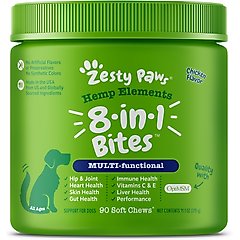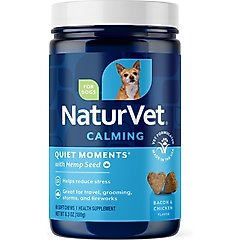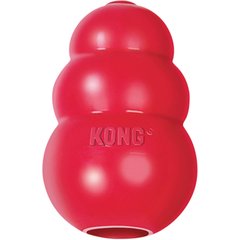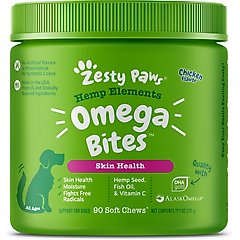Can Dogs Eat Hemp Seeds?
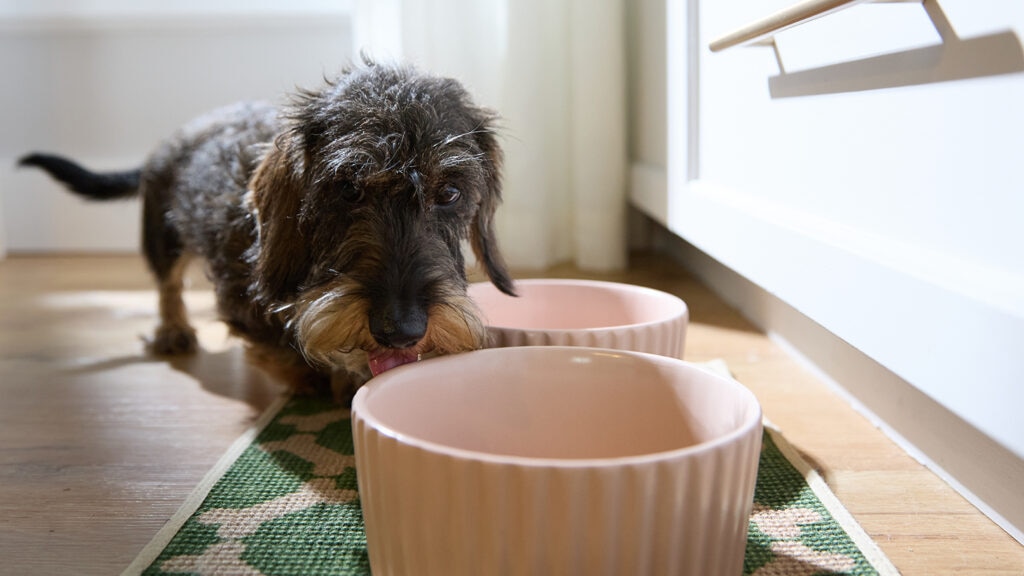
Photo by Chewy
Hemp seeds are a popular superfood in human diets, thanks to their healthy fats and plant-based protein. But can dogs eat hemp seeds too?
Yes, when fed in moderation and served the right way, hemp seeds can be a nutritious addition to your dog’s diet. However, you might want to consider a few precautions before offering them as a treat.
Before introducing any new food into your dog’s diet, always check with your veterinarian.
Key Takeaways
- Hemp seeds can be a healthy treat for most dogs—offering omega fatty acids, protein, and fiber—but they should be served plain and in small portions.
- Because hemp seeds are high in calories and fat, overfeeding them can cause digestive upset, weight gain, or pancreatitis.
- Serving size depends on your dog’s weight, with extra-small dogs getting about 1/4 teaspoon per day and extra-large dogs up to 2 teaspoons.
What Are Hemp Seeds?
Hemp seeds are the edible seeds of the hemp plant, which is botanically known as Cannabis sativa. Although they come from Cannabis sativa, hemp hearts and hemp seed oil (from the seeds) don’t contain THC or CBD in meaningful amounts, so they have no psychoactive effects, says Samuel Varon, DVM, veterinarian and owner of Broadway Veterinary Hospital, in Sacramento, California.
Hemp seeds are known for their nutritional value and are sold in various forms, including raw, hulled (shell removed), and toasted.
Can Dogs Have Hemp Seeds?
Yes, healthy dogs can safely eat hemp seeds in most forms. Although dogs with a history of pancreatitis should avoid them and other high-fat treats, says Sarah Cortright, DVM, veterinarian and chief medical director for the Underdog Community Project, in Orange County, California.
The following forms of hemp seeds are safe for dogs:
- Raw, lightly toasted, and hulled (also called hemp hearts) hemp seeds are all safe for dogs, as long as the seeds are plain and don’t have any added salt or potentially harmful seasonings, such as garlic or paprika.
- Hemp seed oil for dogs is safe, too, but be mindful of portions. While it’s a good source of omega-3 fatty acids, hemp oil is a concentrated source of fat and should be considered more of a supplement than a treat.
Hemp seeds are also found in store-bought dog food and dog supplements, including the following—but always speak to your vet before giving your dog supplements.
Recommended Products
Are Hemp Seeds Good for Dogs?
Hemp seeds aren’t just safe for dogs, they can be a nutritious addition to their diet too. Some of the key nutrients in hemp seeds include:
- Omega fatty acids: Some evidence suggests that the omega-3 and omega-6 fatty acids may promote healthier skin, support joint function, and improve heart health, largely thanks to their anti-inflammatory properties.
- Plant-based protein: Hemp seeds are comprised of about 40% protein and provide essential amino acids that dogs need for muscle development, tissue repair, and a healthy immune system, says Dr. Cortright.
- Fiber: Hemp seeds also have a high fiber content. Fiber can help keep your dog regular, balance gut bacteria, and help your dog feel full and satisfied.
- Vitamins and minerals: Hemp seeds are rich in important micronutrients such as vitamin E, magnesium, phosphorus, potassium, iron, and zinc, all of which play roles in supporting bone health, digestion, and immune function, according to Dr. Varon.
Are Hemp Seeds Bad for Dogs?
While hemp seeds can be a healthy treat for dogs when given in moderation, they’re not completely risk-free. Overfeeding or improper storage can lead to some unwanted side effects.
Here are a few things to watch out for:
- Digestive upset: Too many hemp seeds at once can cause gas or diarrhea, especially if your dog isn’t used to high-fat or high-fiber foods.
- Weight gain: Hemp seeds are calorie-dense and high in fat. Feeding large amounts regularly could contribute to unnecessary weight gain if the extra calories aren’t properly factored into your dog’s diet, says Dr. Cortright.
- Pancreatitis: Because they’re high in fat, eating too many hemp seeds can also increase the risk of pancreatitis, says Dr. Varon.
- Spoiled seeds: The fat in hemp seeds can go rancid if not stored properly (in a cool, dark place). This may cause digestive upset or make your dog sick.
How Many Hemp Seeds Can My Dog Eat?
Hemp seeds should be considered a treat, not a staple in your dog’s diet. Generally, all treats combined should contribute no more than 10% of your dog’s daily calories. The rest should come from a properly balanced dog food.
It’s always best to start with a small amount to make sure your dog tolerates hemp seeds well before working up to the recommended serving sizes.
Here are some general guidelines for how much—and how often—to feed your dog hemp seeds based on their size, according to Dr. Varon:
| Dog Size | Serving Size | Frequency |
|---|---|---|
| Extra-small dogs (2–10 pounds) | 1/4 teaspoon | Daily |
| Small dogs (11–20 pounds) | 1/2 teaspoon | Daily |
| Medium dogs (21–50 pounds) | 1 teaspoon | Daily |
| Large dogs (51–90 pounds) | 1 1/2 teaspoons | Daily |
| Extra-large dogs (91+ pounds) | 2 teaspoons | Daily |
How To Safely Feed Hemp Seeds to Your Dog
In addition to serving size, there are a few other things to keep in mind to make sure you’re feeding hemp seeds to your dog safely.
- Opt for hulled hemp hearts. These are easier for dogs to digest compared to whole seeds with shells, says Dr. Cortright.
- Choose plain, unsalted hemp seeds. Avoid flavored, salted, or roasted varieties with added ingredients that could be harmful to dogs.
- Start with a small amount. Introduce hemp seeds gradually to ensure your dog tolerates them well.
- Store them properly. Keep hemp seeds in an airtight container in the fridge or in a cool, dark place to prevent spoilage.
With these tips in mind, here are some ways to serve hemp seeds to your dog:
- Sprinkle over your dog’s regular kibble or wet food for a quick and easy nutrient boost.
- Blend into dog-friendly smoothies using ingredients like plain, unsweetened yogurt (no xylitol) and banana. You can spread this on a lick mat, like the Pink Papyrus Lick Mat, or freeze it in a KONG toy.
Recommended Products
- Incorporate into any homemade dog treats, like these pumpkin pancakes.
- Offer as part of store-bought dog chew supplements, like the Zesty Paws Omega Bites (with the approval of your vet, of course!).
Recommended Product
My Dog Ate Too Many Hemp Seeds—What Do I Do?
Hemp seeds are unlikely to cause serious issues, but if your dog eats too many, they might experience some digestive upset and symptoms such as:
- Vomiting
- Diarrhea
- Lack of appetite
- Lethargy
In most cases, these symptoms will resolve on their own, but if diarrhea or vomiting is persistent (lasting more than 24 hours) or severe, call your vet for advice on next steps.
FAQs About Hemp Seeds for Dogs
Can puppies have hemp seeds?
Generally, puppies can have a small amount of hemp seeds, but check with your veterinarian first. Puppies have specific nutritional needs and sensitive digestive systems, so you don’t want to overdo it.
Is hemp seed oil good for dogs?
Yes, hemp seed oil can be good for dogs when given in appropriate amounts. It is a concentrated source of fat and calorie-dense, though, so check with your vet first, then introduce it slowly and be mindful of portions, says Dr. Cortright.
Can dogs eat hemp seeds every day?
Yes, dogs can eat hemp seeds every day, as long as they tolerate them well. Make sure you’re factoring in the added calories and sticking to recommended serving sizes.
How many hemp seeds can a dog safely eat per day?
It depends on their size. Generally, an extra-small dog can eat about 1/4 teaspoon per day, while an extra-large dog can have up to 2 teaspoons.
Can dogs eat raw hemp seeds?
Yes, dogs can eat raw hemp seeds, which are usually sold as “hemp hearts.” In fact, these may be easier for dogs to digest.

